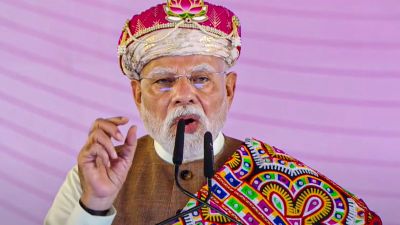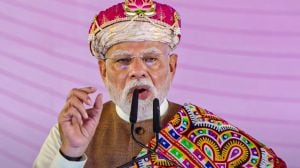Towards the near west
Prime Minister Vajpayee has concluded a significant tour of Russia, Tajikistan and Syria. I use the word ‘‘significant’’...

Prime Minister Vajpayee has concluded a significant tour of Russia, Tajikistan and Syria. I use the word ‘‘significant’’ for two reasons. First, after a decade of restructuring new equations with the Russian Federation, last week’s trip signalled a stabilising and measured expansion in bilateral ties. Second, the visit to Tajikistan and Syria is a reflection of India attaching much needed importance to its relations with important countries in Central and West Asia.
The context in which Vajpayee’s visit took place is critical. Russia and India are deeply interested and involved in the stabilisation of Afghanistan and Iraq, as well as the countries of Central Asia from Azerbaijan to Kyrgyzstan. Russia wishes to retain its influence in Central Asia in the face of growing US-led presence of West European countries in the region.
India has a security and economic stake in the region, given its market potential and energy resources. There is also a broader convergence of interests between Russia and India. Both are opposed to religious fanaticism. Both face challenges to their territorial integrity by separatist movements fuelled by religious extremism (Chechnya and Jammu and Kashmir). Both share concerns about cross-border terrorism. Both are concerned about the unilateralism implicit in America’s foreign and security policies. Both are worried about the marginalisation of the UN and erosion of the multilateral processes of maintaining peace and security on the basis of international consensus.
Despite their political, strategic and economic limitations, India and Russia have reservations about a unipolar world order. This convergence of views and interests on macro-level issues is strengthened by equally substantive mutuality of interests in the bilateral context. Russia remains an important supplier of defence equipment. The potential of Indo-Russian cooperation to ensure energy security for both is concrete and positive.
Despite its adherence to many of the international regimes regarding transfer of technologies, particularly dual use technology, Russia has been much more forthcoming than most other countries in meeting India’s technology requirements — not only in terms of transfer of technology on a commercial basis but also in joint development of technologies responsive to the commercial infrastructural requirements of both countries.
The economies of the Russian Federation and India are mutually complementary in terms of bilateral trade, a phenomenon which, with the passage of time, is characterised by increasing volumes and an incrementally diversified commodity structure. This cooperation is particularly useful to both in the peaceful uses of space and nuclear technologies. Russia has been generally supportive of India’s policy orientations towards Pakistan and on the J&K issue. Compared to the comparative ambivalence of Boris Yeltsin towards India, President Vladimir Putin seems more convinced about the importance of political, economic and strategic equations with India.
Both Russia and India share critical concerns about developments in Iraq and Afghanistan after the US-led military operations in these two countries. Both are concerned about the punitive attitude of the US towards countries like Syria and Iran, with whom both have close relations.
So apart from being an annual consultation at the summit level agreed upon between Putin and Vajpayee, this trip has additional significance in this contextual background. The two leaders issued a joint declaration and signed 10 agreements. These cover the spheres of science and technology, space, earthquake research, bilateral trade and defence supplies.
It is relevant to mention that Indo-Russian trade has suffered some stagnation. The total volume is only of the order of $1.5 billion, compared to the much higher volumes of trade India has with the US, China and the EU. The prime minister’s visit will hopefully provide a needed impulse.
ONGC (Videsh) has invested nearly $2 billion in the Sakhalin-I oil and gas project. Russia is helping India build two nuclear reactors in Tamil Nadu. It is also interested in inputs from India in information technology. There has been much speculation about defence cooperation and the purchase of aircraft carrier Gorshkov. Cooperation in missile technology has a continuity which is of importance both for peaceful and defence purposes.
Some dark spots too must be noted. There is no categorical assurance of Russian support to India in the context of UN reforms or a permanent seat in the Security Council. While Russia has endorsed the pre-condition of ending cross-border terrorism for resumption of dialogue with Pakistan, unlike during Soviet times, there is no articulated support for J&K being an integral part of India. Besides, cooperation in sp-ace and nuclear energy would be subject to Russia’s equations with the US in various international regimes. Fortunately, India’s capacity for self-reliance in these two spheres cuts its dependence on any foreign country.
Vajpayee’s visits to Syria and Tajikistan are of high significance. India’s equation with the Tajik government of President Rakhmanov is important in dealing with Afghanistan developments and countering Islamic extremism in Central Asia. The visit follows Defence Minister George Fernandes’s earlier visit to Kyrgyzstan, Tajikistan and Uzbekistan. Foreign Minister Yashwant Sinha too was in Tashkent this month. The neglect of Central Asia in India’s foreign policy over the last five-six years seems to be rectified.
Vajpayee Syria visit affirms India’s reservations about unilateral and at times illogical, pre-emptive orientations of US policies in West Asia. The two countries are keen to facilitate cooperation in information technology and biotechnology. ONGC (Videsh) too is expected to collaborate with Syrian companies to prospect for oil.
Vajpayee’s visit manifests an integrated orientation in India’s foreign policy, in creating political equations with the extended Asian neighbourhood. A broader strategic vision is again animating India’s foreign policy, a vision which was initiated by Rajiv Gandhi and Narasimha Rao more than a decade ago.
Photos


- 01
- 02
- 03
- 04
- 05





























